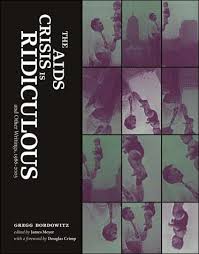 The AIDS Crisis Is Ridiculous and Other Writings, 1986-2003
The AIDS Crisis Is Ridiculous and Other Writings, 1986-2003
by Gregg Bordowitz, edited by James Meyer
MIT Press. 307 pages, $35.
COVERING a seventeen-year period, these essays chronicle the life and work of Gregg Bordowitz, an AIDS activist who was an innovator in the use of alternative media to educate the public and to document the epidemic. In the first essay, “Geography Notes: A Survey,” he imagines what might have been if AIDS hadn’t become the driving force in his life, when the voice of an emerging art critic was deflected into that of an AIDS activist who has dedicated his life to the creation of a documentary record of the epidemic.
Describing his work filming some of the actions of act-up, an organization in which he played a pivotal role, Bordowitz writes: “Video activists are everywhere met with the same challenges. We must call into question the established structures of the media. We must create new ways to make and distribute media.” Instead of relying solely on the available means of persuasion, he and other AIDS activists developed new techniques to draw attention to their cause. Notable among them was a technique that broke down the “fourth wall” between the audience and the action on-screen: “Imagine a screening. In a local community center a consumer VCR deck and a TV set sit on a table. Representatives from the various communities affected by AIDS sit in front of the TV. They watch a video composed of interviews with each of them. They see themselves pictured in relation to one another as they sit next to one another.”
In the title essay, Bordowitz articulates the difference between mainstream and alternative media as the difference between doing it to make a profit and doing it to disseminate information that may be life-saving. Writes Bordowitz: “the production of documentary overlaps with the efforts of political organizing. In order to tear down the surfaces that house the ‘public discussion’ of AIDS, we have to build alternative structures, structures that can generate and foster an affirmative culture for people living with AIDS.” Bordowitz’s writing is at its best when he inserts himself into the narrative and checks the truth of his arguments against the reality of his HIV-positive subjectivity. “Dense Moments,” which describes the events leading up to and following his HIV diagnosis, is the standout essay in this respect. Survival is a critical issue in the text.
Along with being a thoroughly engaging read, The AIDS Crisis Is Ridiculous is noticeably well-designed. The frequent inclusion of stills from the films and videos described is a welcome addition. The AIDS Crisis Is Ridiculous is thoughtful and provocative, and may well find a place in the permanent canon of AIDS literature.
_____________________________________________________
Chris Bell teaches cultural studies at the University of Bielsko-Biala in Poland.





